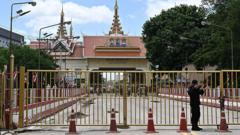The political landscape in Thailand faces significant turmoil as Prime Minister Paetongtarn Shinawatra is suspended pending a court ruling over a controversial phone call, intensifying the scrutiny of her government.
Thai Prime Minister Put on Hold as Court Reviews Controversial Phone Call

Thai Prime Minister Put on Hold as Court Reviews Controversial Phone Call
Suspension stems from leaked audio criticizing a military commander and communicating with Hun Sen.
In a dramatic turn of events, Thailand's Constitutional Court has placed Prime Minister Paetongtarn Shinawatra on suspension while assessing a petition that seeks her removal from office. The suspension is a response to public outcry following the release of a leaked phone conversation between Paetongtarn and former Cambodian leader Hun Sen. In this recording, Paetongtarn refers to Hun Sen as "uncle" and criticizes a Thai military commander, provoking anger and calls for her resignation.
The court's decision—made with a 7-2 vote—leaves the country’s political future uncertain, especially as it comes at a time when Paetongtarn's coalition government has been precariously balanced. Following the departure of a crucial conservative ally two weeks earlier, her ruling alliance had already been struggling with a slim majority. In the interim, the deputy prime minister will step in as acting leader while Paetongtarn retains her position as culture minister, a role she was assigned shortly before the suspension.
In light of the leaked audio that triggered the backlash, Paetongtarn has publicly apologized, asserting her intention was solely to address political matters concerning a long-standing border dispute with Cambodia. Her supporters believe the outcry reflects a targeted attack against her by conservative factions within the government. She defended her actions, emphasizing a lack of personal ambition in her communication with Hun Sen, stating her priority was the country’s stability and safety.
Should the court ultimately dismiss her, Paetongtarn will be the second prime minister from the Pheu Thai party to be removed since August of the previous year, when her predecessor, Srettha Thavisin, faced a similar fate over a cabinet appointment. This pattern of legal interventions by the Constitutional Court raises concerns about the politicization of judicial processes in Thailand, with critics highlighting the repeated dissolution of political parties to stifle competition.
Political observers note that Paetongtarn, who at 38 is Thailand's youngest prime minister and only the second woman to hold the office, is already experiencing dwindling public support. Her approval rating dropped to 9.2% last weekend, a stark decline from 30.9% in March. Simultaneously, her father, Thaksin Shinawatra, a prominent and controversial figure in Thai politics, is facing his own challenges in court, adding further strain to Paetongtarn's administration.
As Thailand's political drama unfolds, the implications of these judicial actions resonate deeply through its complex political history, echoing the past struggles of the influential Shinawatra family amidst ongoing tensions with conservative and military factions.
The court's decision—made with a 7-2 vote—leaves the country’s political future uncertain, especially as it comes at a time when Paetongtarn's coalition government has been precariously balanced. Following the departure of a crucial conservative ally two weeks earlier, her ruling alliance had already been struggling with a slim majority. In the interim, the deputy prime minister will step in as acting leader while Paetongtarn retains her position as culture minister, a role she was assigned shortly before the suspension.
In light of the leaked audio that triggered the backlash, Paetongtarn has publicly apologized, asserting her intention was solely to address political matters concerning a long-standing border dispute with Cambodia. Her supporters believe the outcry reflects a targeted attack against her by conservative factions within the government. She defended her actions, emphasizing a lack of personal ambition in her communication with Hun Sen, stating her priority was the country’s stability and safety.
Should the court ultimately dismiss her, Paetongtarn will be the second prime minister from the Pheu Thai party to be removed since August of the previous year, when her predecessor, Srettha Thavisin, faced a similar fate over a cabinet appointment. This pattern of legal interventions by the Constitutional Court raises concerns about the politicization of judicial processes in Thailand, with critics highlighting the repeated dissolution of political parties to stifle competition.
Political observers note that Paetongtarn, who at 38 is Thailand's youngest prime minister and only the second woman to hold the office, is already experiencing dwindling public support. Her approval rating dropped to 9.2% last weekend, a stark decline from 30.9% in March. Simultaneously, her father, Thaksin Shinawatra, a prominent and controversial figure in Thai politics, is facing his own challenges in court, adding further strain to Paetongtarn's administration.
As Thailand's political drama unfolds, the implications of these judicial actions resonate deeply through its complex political history, echoing the past struggles of the influential Shinawatra family amidst ongoing tensions with conservative and military factions.




















